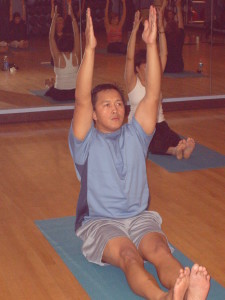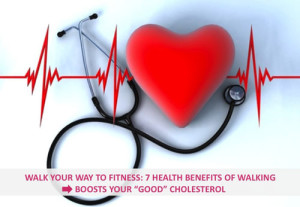by Michelle Sutton-Kerchner
With the holidays upon us, weight gain is an understandable concern. Although the bathroom scale gets special attention, body weight isn’t the only number in danger of climbing. T’is the season of higher cholesterol as well …
Rich gravies, creamy side dishes, and irresistible desserts define many holiday meals. Combined with higher stress levels to meet year-end deadlines while still singing a jolly jingle, you have a recipe high in cholesterol. Although your waistline may not reveal it, your blood levels may. Research assures us exercise is an excellent method for lowering cholesterol. Member success continues to further prove this fact. A good workout can charge a sluggish body– noticeably by increasing energy and behind-the-scenes by improving blood levels and cardio functioning.
How Exercise Helps
Controlling cholesterol can be a yearlong challenge. Moderate exercise most days of the week helps prevent numbers from climbing. During the holidays, you may need to add a little more prevention via the Exercise Floor as diet takes a slight dive. A combination of exercise and proper nutrition is the first-line treatment plan for maintaining heart health. Recent research has been able to better define the impact of fitness.
Exercise attacks cholesterol from several directions. It helps move LDL (bad cholesterol) from the blood. This prevents it from adhering to blood vessel walls and overall clogging the system. Instead, it is deposited in the liver to be converted for digestion or excretion. In this way, exercise helps rid the body of LDL.
Exercise also increases the size of the transportation devices, protein particles, which carry cholesterol through the body. This combination of protein particles and cholesterol are called lipoproteins. The bigger, fluffy ones travel better. When small and dense, they easily can get into linings of blood vessels and the heart.
Along with the many health benefits of obtaining a healthy weight, include cholesterol management. Although genetics, age, and diet all contribute to your cholesterol status, weight is an important factor– and one you can control. Carrying excessive weight is a heavy physical strain in itself. Losing only five to 10 percent of an unhealthy body weight can significantly improve cholesterol levels. It also decreases the LDL cholesterol in your blood and its associated risks. Here is another way exercise comes to the rescue for numbers teetering on the edge.
Hidden Danger

Stop appeasing yourself with the notion what you can’t see, won’t hurt you. Without a scale, tight waistline, or mirror to monitor your cholesterol, it is easy to ignore. A day of cookie baking, a night of chip munching, or a week of lazing on the couch (exhausted with bags of fast food) does not go unnoticed by the complex systems within our bodies.
Those with borderline cholesterol should assume the holidays are to their levels what countless cookies and milk are to Santa’s belt. Combat it with the correct approach to fitness. Regular, moderate exercise helps maintain current cholesterol levels with the possibility of lowering LDL levels. However, recent research proves a more intense workout is more successful at lowering them. This can be accomplished with exercise alone. You know, for those times when adherence to a healthy diet might be an issue (eggnog, anyone?).
High-intensity exercise delivers the added benefit of raising HDL (good cholesterol). This outcome actually rids the blood of cholesterol. Unlike LDL, which benefits from less aggressive fitness programs, HDL requires vigorous exercise to produce a positive effect. Moderate exercise can keep cholesterol levels from rising.
According to studies, those whose cholesterol benefits the most from exercise are not the die-hard dedicated veterans. Rather, the fitness delinquent who suffers the worst diet can reap the most reward from exercise’s effects on cholesterol. This is good news for all those rushing through the holiday season with missed workouts and questionable food choices. This population has been shown to reduce LDL by 10 to 15 percent and increase HDL by 20 percent. (That’s not an excuse to neglect diet and exercise to show the biggest improvement. These folks simply have more room for improvement!)
Cholesterol-Lowering Exercises

Whatever your current fitness routine, if cholesterol is a concern, there are specific ways to blast its threat. Even if cholesterol isn’t your main holiday health worry, these tips assure an effective workout for healthy heart, weight, and mental state. The goal of your fitness program should be to increase oxygen intake and raise heart rate for more than 12 minutes most days of the week. Aerobic exercise for 30 minutes each day is recommended for maximum results. If your schedule is packed, squeeze in15-minute slots for aerobic activity between other commitments.
Be sure to achieve your target heart rate during whichever activity you chose. Your target heart rate should be between 60 and 80 percent of your maximum heart rate, for the most impressive results. A personal trainer, Group Fitness instructor, or on-site nurse can help determine your target heart-rate zone. They can also advise on safe, effective aerobic exercises to help reach your goals, whether counteracting tailgate parties or accomplishing a New Year’s Eve little black dress.
Consider aquatic exercise, give the elliptical equipment your best, or investigate an interesting Group Fitness class. (See the Center’s Web site for the latest Group Fitness schedule.) Take advantage of the Center’s aquatic offerings. Swimming has shown to be a powerful cholesterol-lowering activity. Find something you enjoy and engage in it. This will make it easier to remain committed and quicker to accomplish results. Weight training is also valuable and can complement the cardio aspect of your workout.
 Studies indicate that yoga and Tai Chi have beneficial effects on cholesterol levels. However, it is unclear as to what extent study participants exerted themselves during these activities. Particularly with yoga, there are a variety of types and skill levels, which can determine benefits gained.
Studies indicate that yoga and Tai Chi have beneficial effects on cholesterol levels. However, it is unclear as to what extent study participants exerted themselves during these activities. Particularly with yoga, there are a variety of types and skill levels, which can determine benefits gained.
A Beginner’s Approach
If your cholesterol has been dangerously high or you have heart health issues, slowly increase (or start) your exercise program. Check with the Center nurse or your physician to evaluate your heart health. Blood work or a heart stress test may be recommended, and monitoring should be frequent.
By taking this smart approach, you can manage cholesterol safely and with a baseline. The day for Zumba or kickboxing will come, but you need a program you can start without delay. Those cholesterol numbers have a way of creeping up when we procrastinate.

Counteract low-impact workouts with increased volume. Spend more time at decreased intensity to see results. Avoid straining yourself but work your way up to 30 to 60 minutes of moderate activity daily. As your fitness level improves, you can shift to more intense routines done for less time. Gradually, you will whiz through them. You might be able to safely manage both increased exercise intensity and volume!
Know Your Numbers
After the New Year’s champagne has gone flat and festivities are a memory, follow up on your cholesterol or other health issues impacted by the holiday’s effect on healthy lifestyle. Hopefully, all the reps on the Exercise Floor and miles on the elliptical you sweat through steered you clear. Regular blood work can provide peace-of-mind, or motivation to take further action.
A truly happy season is one that improves your health.
Sources
“Exercise to Lower Cholesterol,” by Susan Davis at www.webmd.com.
www.mayoclinic.com
Image Credits
Holiday desserts (introductory photo): www.flickr.com/photos/ms4denmark/318281252; Mark Sadowski
Fruited cheesecake: http://www.flickr.com/photos/boonlee89/5195074399; Alexis Fam Photography
Boost good cholesterol: www.flickr.com/photos/88092208@N06/9770700395; UrbaneWomenMag
 Fitness & Wellness News Your Source for Fitness News, Wellness News, Health News, and Nutrition News!
Fitness & Wellness News Your Source for Fitness News, Wellness News, Health News, and Nutrition News!




